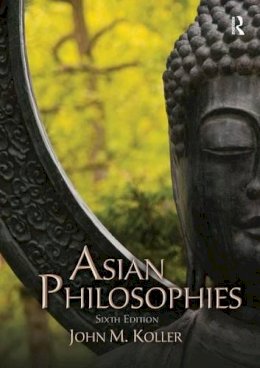
Stock image for illustration purposes only - book cover, edition or condition may vary.
Asian Philosophies
John M. Koller
FREE Delivery in Ireland
Description for Asian Philosophies
paperback. Num Pages: 352 pages, Illustrations, maps. BIC Classification: 1F; HPDF; HR; JNA. Category: (P) Professional & Vocational. Dimension: 229 x 180 x 16. Weight in Grams: 468.
With an inside view from an expert in the field, solid scholarship, and a clear and engaging writing style, Asian Philosophies invites students and professors to think along with the great thinkers of the Asian traditions. John M. Koller is a scholar and teacher who has devoted his life to understanding Asian thought and practice. He wrote this text to give readers access to the rich philosophical and religious ideas of both South and East Asia.
Product Details
Publisher
Routledge United States
Place of Publication
New York, United States
Shipping Time
Usually ships in 15 to 20 working days
About John M. Koller
In This Section: I. Author Bio II. Author Letter I. Author Bio John M. Koller is a Professor of Asian and Comparative Philosophy at Rensselaer Polytechnic Institute. His research areas include Buddhism and Psychoanalysis, and Philosophy of Religion. He is the author of more than fifty journal articles ... Read moreand chapters in edited books as well as five books. In addition, he is the recipient of several prestigious teaching awards: Selected Outstanding Educator of America, 1975; Named Outstanding World Philosopher, 2005; Wm. H. Wiley Distinguished Faculty Award, 1986; and Rensselaer Distinguished Teaching Fellow, 1990-92. II. Author Letter Dear Colleague, Asian Philosophies introduces students to the main questions and methods of philosophy through a careful consideration of the major Asian philosophical traditions. It was written to help students answer three important questions. First, what are the key ideas that have shaped Asian cultures? Second, what are the fundamental values that have guided the lives of Asian peoples over the millennia? Third, how have the great thinkers of Asia thought about these ideas and values? In trying to answer these questions, students learn how to think about and answer their own important philosophical questions: Who am I, What is the best way to live? What can we know? Thinking along with—and sometimes against—the great philosophers stimulates them to think more deeply and carefully about their own philosophical questions. When I first started teaching, at St. Thomas University, my students and I examined only Western traditions, adopting as our guides Plato and Aristotle, Descartes and Hume and Sartre and Wittgenstein, philosophers who both I and my teachers at St. Thomas and the University of Chicago had found exciting. I learned that helping students find inspiring guides from among the great philosophers really opened their minds to the joys of philosophy. Later, after my immersion in Asian philosophies at the East-West Center and the University of Hawaii, I was able to help my students choose as philosophical guides great philosophers from among the Asian traditions as well. At the University of Hawaii I was fortunate to have terrific teachers. Professors Chung-ying Cheng and Wing-tsit Chan introduced me to Chinese philosophy. Professor Kenneth Inada introduced me to Buddhist philosophy and Yasutani Roshi introduced me to zazen. Professor S.K. Saksena guided me through the intricacies of Indian philosophy for two wonderful years. Professors T.R.V. Murti, Kalidas Bhattacharya, and D.M. Datta were postgraduate mentors in India, while Professor George Artola and Babu Krishnacharya helped me learn Sanskrit. In my books and articles, as in all of my teaching, I have tried to pass along to my students what I have been fortunate enough to have learned from my teachers, my colleagues and students. My experience in teaching at a variety of colleges – as diverse as St. Thomas, Chaminade College, Colorado State University, Rensselaer Polytechnic, and SUNY Stony Brook – has convinced me that teaching is primarily about motivating students to inquire and helping them learn, not about passing along information. Asian Philosophies attempts to help students ask and answer the big questions of life, which despite significant cultural differences are basically the same everywhere. Studying the great philosophical traditions of Asia, makes it possible for us to understand these traditions’ carefully considered answers to the most important questions of life, answers that are supported by profound insights and good reasons. Because these answers have guided the thought and action of the peoples of Asia over the centuries, they provide the basic clues to the guiding ideas and values of Asian societies today. And in today’s world, where the very future of humankind depends upon understanding and cooperation among people with diverse values and ideas, it is imperative that these values and ideas be understood. I would be delighted to hear from anyone teaching or studying this book, and will gladly respond to your questions and concerns. And, of course, I would appreciate any suggestions for improvements. My email is kollej@rpi.edu. With my very best wishes, John M. Koller Professor Emeritus Rensselaer Polytechnic Institute Show Less
Reviews for Asian Philosophies

